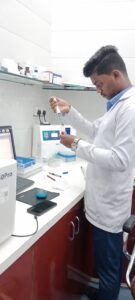Diploma in Medical Laboratory Technology
A Diploma in Medical Laboratory Technology (DMLT) is a specialized program that focuses on training students to become skilled professionals in the field of medical laboratory sciences. This diploma program provides comprehensive knowledge and practical skills necessary for working in various healthcare settings.
During the DMLT program, students gain a deep understanding of medical laboratory technology and its applications in diagnosing and monitoring diseases. They learn about different laboratory disciplines, such as clinical biochemistry, microbiology, hematology, histopathology, immunology, and molecular biology. Through theoretical classes, laboratory practical sessions, and clinical training, students develop expertise in laboratory techniques, procedures, and equipment operation.
The curriculum of a DMLT program typically covers topics like laboratory safety, specimen collection and processing, laboratory instrumentation, quality control, and analysis of various body fluids and tissues. Students are trained to perform a wide range of laboratory tests, interpret results, and generate accurate reports.

Practical training plays a crucial role in the DMLT program. Students have access to well-equipped laboratories where they gain hands-on experience in handling laboratory instruments, performing tests, and ensuring quality control. They learn to work with precision and attention to detail, following standard operating procedures and maintaining accurate records.
Apart from technical skills, the DMLT program emphasizes the development of professional values, ethical conduct, and effective communication. Students learn the importance of patient confidentiality, empathy, and professionalism in the healthcare environment.
After completing a DMLT program, graduates are equipped to work as medical laboratory technicians in hospitals, diagnostic centers, research institutes, blood banks, or public health agencies. They play a vital role in assisting medical professionals in the accurate diagnosis, treatment, and prevention of diseases.
A Diploma in Medical Laboratory Technology offers a pathway to a rewarding career in the healthcare industry. It provides a solid foundation in laboratory sciences, prepares students for entry-level positions in medical laboratories, and can serve as a stepping stone for further education and specialization in the field of medical laboratory technology.
Future Career Options after Diploma in Medical Laboratory Technology
After completing a DMLT program, you can pursue various career options in the field of medical laboratory technology. Common career paths include working as a medical laboratory technician, laboratory assistant, phlebotomist, laboratory supervisor, or laboratory technician in hospitals, diagnostic laboratories, research institutes, blood banks, or public health agencies.
While a DMLT program focuses on training for laboratory technician roles, some organizations may offer employment opportunities as medical laboratory technologists to individuals with a DMLT qualification. However, it’s important to note that technologist positions typically require a Bachelor’s degree in Medical Laboratory Technology (BMLT) or a related field.
With a DMLT qualification, you can develop expertise in specific areas of medical laboratory technology through on-the-job training, continuing education programs, and professional development courses. Specialization options may include clinical biochemistry, microbiology, hematology, histopathology, immunology, or molecular biology.
Yes, after completing a DMLT, you have the option to pursue further education or upgrade your qualification. You can consider enrolling in a Bachelor’s program in Medical Laboratory Technology (BMLT) or related fields to enhance your knowledge, skills, and career prospects. Higher qualifications can lead to advanced job roles and better career opportunities.
While research and development opportunities may be limited at the technician level, you can still contribute to research projects or quality improvement initiatives within your organization. Pursuing higher education or collaborating with research institutions can open up further research prospects in the field.
Yes, with a DMLT qualification, you can work in the field of public health, particularly in laboratory settings that focus on disease surveillance, outbreak investigation, or public health research. Such roles contribute to monitoring and preventing the spread of diseases, promoting public health initiatives, and ensuring the quality of laboratory testing in public health programs.
International employment opportunities for individuals with a DMLT qualification may vary depending on the specific country’s requirements, certifications, and licensing. It is advisable to research the destination country’s regulations, fulfill any additional requirements, and possibly pursue international certifications to increase your employability abroad.
To stay updated with advancements in medical laboratory technology, you can join professional organizations or associations related to the field. Attend conferences, workshops, and seminars, and participate in continuing education programs. Engage in networking, read scientific journals, and follow reputable online resources to keep abreast of the latest research, technology, and industry trends.
While career advancement opportunities may be limited at the technician level, you can pursue professional growth by acquiring specialized certifications, attending skill development programs, and gaining experience in diverse laboratory settings. Continuous learning, upgrading your qualifications, and demonstrating proficiency in your work can lead to better career prospects and advancement opportunities.
Job opportunities can be found through various channels, including online job portals, healthcare institution websites, professional networks, and recruitment agencies. Stay connected with alumni networks, attend job fairs, and actively engage in networking to increase your chances of finding suitable job opportunities.
Remember that specific career opportunities may vary based on factors such as location, market demand, and individual preferences. It is advisable to conduct thorough research, explore various career paths, and seek guidance from professionals in the field to make informed decisions regarding your future career after completing a Diploma in Medical Laboratory Technology.


